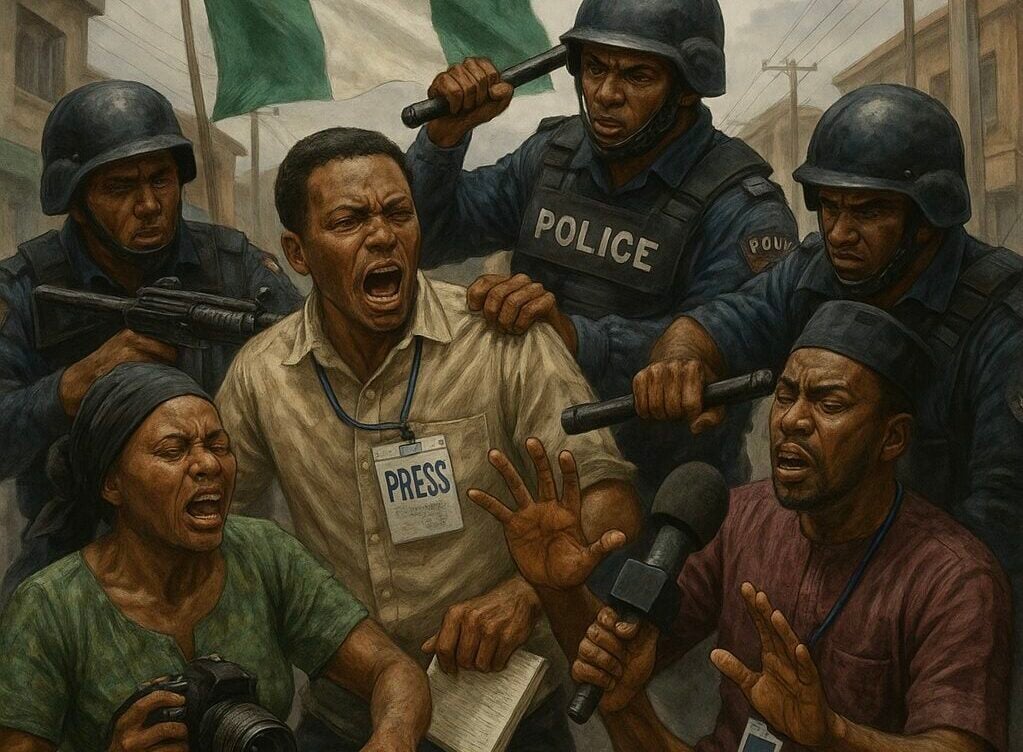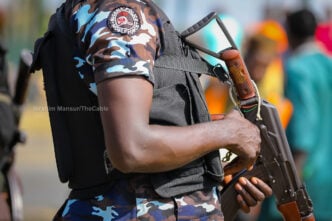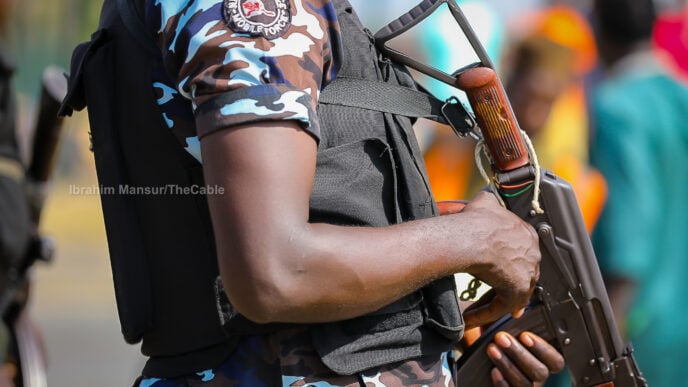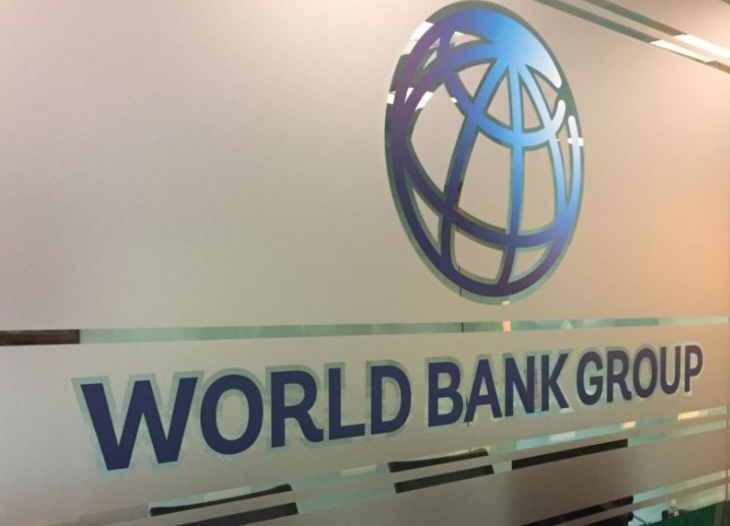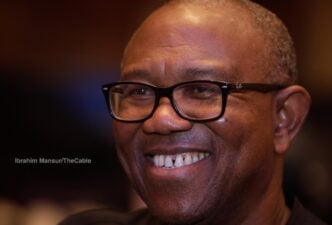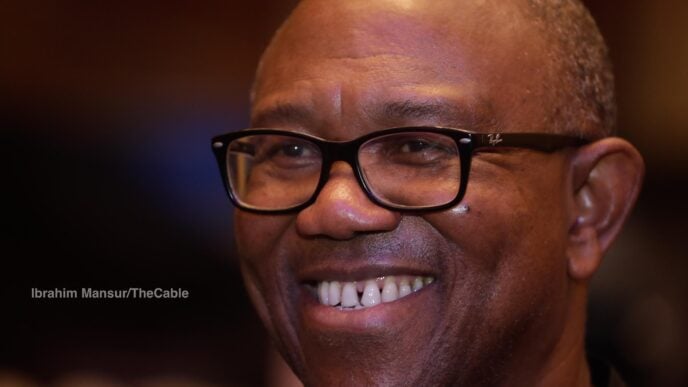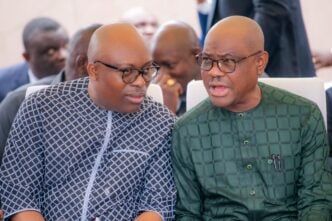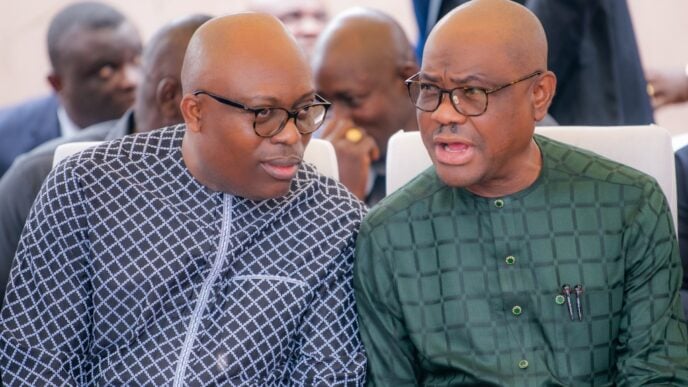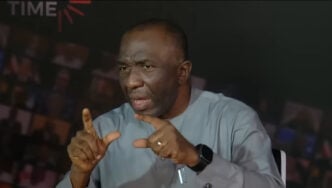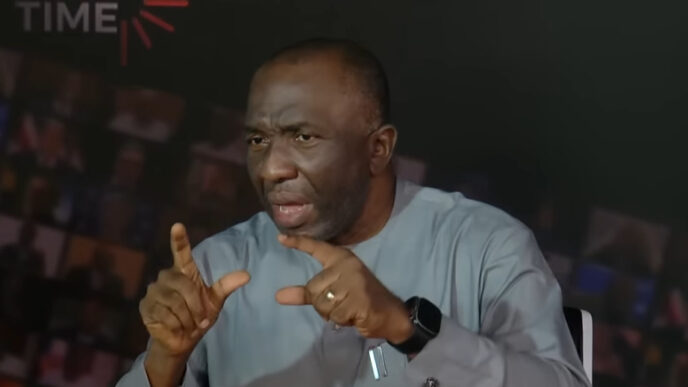An artistic illustration of Nigerian journalists on duty being attacked by security officials... Image generated by ChatGPT
Daniel Ojukwu recalled the afternoon of May 1, 2024, as a day he’d never forget, a day that redefined his life as a journalist. It was a public holiday, two days before World Press Freedom Day; he was walking on Herbert Macauley Street in the Yaba area of Lagos state when six armed persons jumped out from a vehicle and surrounded him. It looked like a scene from an action movie.
Shocked, Ojukwu tried to make sense of what was happening; then they introduced themselves as police officers, five men and one woman, all in mufti. Apparently, they had tracked his phone to the area.
Right there on the street, they told Ojukwu that he was under arrest. He asked for their ID and arrest warrant. They responded by reciting the usual statement: “You have the right to remain silent. Anything you say can be used against you.”
Then they brought out a piece of paper and tossed it to his face. On it, he saw his name and the word “cyberstalking” legibly written. He guessed it must be based on something he had posted on social media. Before he could process the whole content, they folded the paper and commanded him to follow them.
Advertisement
Ojukwu told them he needed to make some calls, at least for his family or office to know where he was and what had happened. The officers objected. They turned him around, emptied his pockets, took his phone, removed his fez cap, wristbands, and even his glasses. His hands behind his back, they handcuffed and threw him into their navy-blue Sienna vehicle.
Everything happened so fast. Five minutes. They drove out of the area.
According to Ojukwu, he didn’t resist the arrest. No further argument or negotiation. He had always known that a day like that would come. He said every journalist expects that, one day, the police would come for you because of a story you authored.
Advertisement
Inside the vehicle, the police officers asked him to take them to his house for a search. Ojukwu refused since they had no search warrant. They took him to the State Criminal Investigation and Intelligence Department (SCIID), Panti. Again, Ojukwu requested to make a call, and they refused. The police officers told him point blank that he belonged to a criminal syndicate and making a call would jeopardise their investigation.
“I told one of the officers that they couldn’t hold me there for longer than 24 hours without charging me to court. The officer laughed and said, ‘These young men who get their law, their constitution from social media. Who told you we cannot keep you here? We can keep you for as long as we want. We are from Abuja. We are federal policemen. We are the IGP’s boys.’ That was what he said to my face,” Ojukwu told TheCable in an interview.
The police officers asked him to write a statement. He refused and demanded the presence of his lawyer before he would make a statement. The officers left. That Wednesday evening, he slept in a dingy cell with a myriad of other suspects.
The next day, the officers showed up. But nothing happened. The following day was Friday. It rained, and nobody showed up. Ojukwu remained in the cell, with no food. He kept gulping water. Nobody knew his whereabouts. His family and colleagues were all over Lagos looking for him. Then, they went to police stations and declared him missing.
Advertisement
“None of the policemen could speak to me. They were given strict instructions: nobody should give me a phone, no calls, no access to the public. Nothing,” he said.
“Later, my family found me. My lawyers found me. FIJ found me. Then, efforts were made to get things rolling. They took me out of the cell early on Saturday morning. Was it Saturday? Yeah. Saturday or Sunday. Things are foggy in my head. Anyway, they put me on a flight to Abuja.
“It was a spectacle. I looked very messy. I was still in the same clothes I’d worn from day one. My hair, my body, everything was rough. The only thing I had managed to do was brush my teeth and bathe using the soap and toothbrush I got in custody. But still, I could perceive myself. It was that bad.”
Then, they showed him the story he wrote that got him into the mess.
Advertisement
THE STORY THAT LANDED HIM IN POLICE CUSTODY
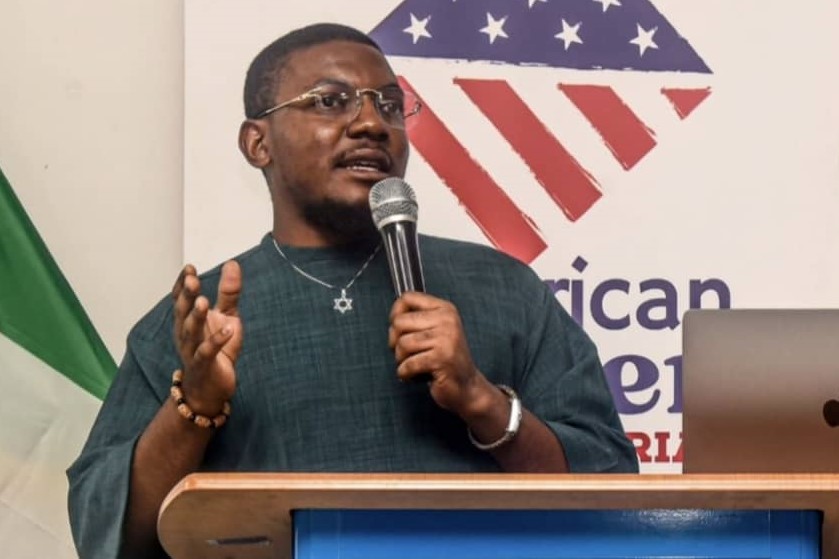
On November 7, 2023, Ojukwu, a journalist with the Foundation for Investigative Journalism (FIJ), a Nigerian independent media outlet, wrote a story titled “SPECIAL REPORT: 2 Weeks Before End of Buhari’s Tenure, Special Assistant Adejoke Adefulire Paid a Restaurant N147.1m to Build Classrooms in Lagos. A Lot Was Amiss”.
Advertisement
Orelope-Adefulire, a former Lagos deputy governor, heads the office of the senior special assistant to the president on sustainable development goals (OSSAP-SDGs).
She served in the same capacity in the administration of former President Muhammadu Buhari and was reappointed by President Bola Tinubu.
Advertisement
OSSAP-SDGs coordinates and supervises the federal government’s programmes on SDGs at the national level. The office also executes capital projects.
The story stated that the OSSAP-SDGs paid N147 million to Enseno Global Ventures Ltd, an Abuja-based restaurant, for the construction of one skill acquisition centre (type A) with a pile on the raft foundation and one block of six classrooms at Ajeromi Primary School, Lagos state. The fund was reportedly released to the company on May 15, 2023, 13 days before the end of Buhari’s government.
Advertisement
The story was said to have infuriated Orelope-Adefulire, who petitioned police. The police said Ojukwu had a case to answer over alleged violation of sections of the Cybercrime Prohibition Act 2015.
Getting to Abuja, the nation’s capital, Ojukwu was moved to the National Cyber Crime Centre (NCCC) where he was reminded of his article and alleged offence. He was informed that he’d meet with his accuser the following day. That day, he was moved to the Zone 10 police criminal investigation department, where he was hurled into another cell.
“Monday came. I was expecting to be called out to face my accuser. That was what they promised on Sunday. But nothing happened. I waited, 8 a.m., 9 a.m., 12 noon. Nothing. I just lost my mind,” Ojukwu said.
“By 6 p.m., they came and said, ‘We’re taking you out.’ I thought, yes! Finally. Everyone was smiling. They said they had perfected the bail, that the bail conditions had been varied. Even though they might look stringent on paper, I wouldn’t need to meet all of them.
“I thought, great! They said I might even go home that night or latest, Tuesday morning. The DIG told the cell boss not to let me back in, that they were sorting everything out. I thought the worst was over. I waited all night and didn’t sleep. Tuesday morning came. Nothing happened.
“Then Tuesday afternoon, my IPO came and told me to pack my things. I did. They drove me to the NCCC office. I was chatting with the same officers who arrested me. We laughed, shook hands. Then my IPO came and told me to get into the vehicle. They drove me back to the cell. I have never been more confused in my life. It was a quiet ride. I kept asking what was going on. He wouldn’t say anything. We got to the counter, and he said he was returning a suspect. That messed with my head. I felt betrayed.
“That Tuesday, I didn’t see anyone. No news. No update. Nothing. So I went back into the cell, confused, thinking maybe they wanted to see someone else with me, but couldn’t, so they brought me back. That night, I couldn’t sleep. It was nerve-racking. I didn’t understand what was going on. Nothing made sense. That was the worst day of the whole ordeal. Every other day, I tried to make sense of what was required. But that one? Someone said No, don’t let this guy go. The IGP is sitting on it, and he doesn’t want him to go. I told them that if they don’t want me to go, I’m fine with it.”
Yet, Ojukwu never met his accuser. Then the protests calling for his release began. Every media outlet was on the matter. The pressure became a national affair.
Friends sent him clothes, books, shavers, vaseline, toothbrushes, soap – everything he needed to keep his body and soul together during his sojourn from one police cell to the other.
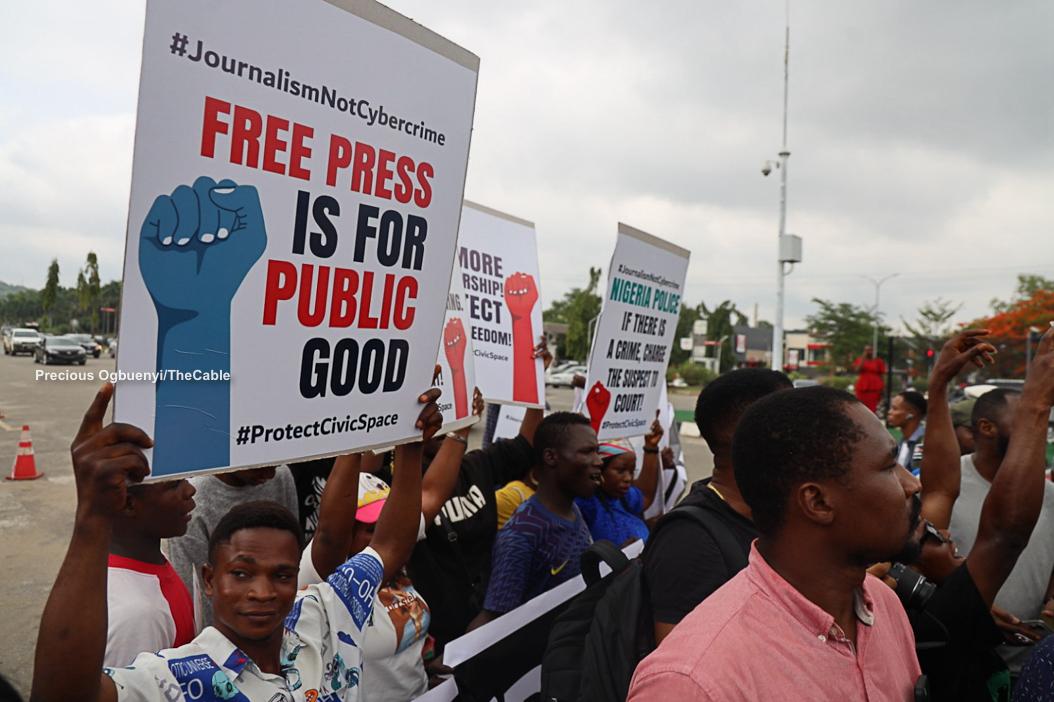
“On Wednesday, I got up early to start my day. I hadn’t really slept. At 7 a.m., I entered the bathroom, and then I heard my name: Daniel Ojukwu! Daniel Ojukwu! When you’re in a cell, the best thing you can hear is your name. I can’t even explain the feeling. It means someone is looking for you. Someone out there cares. Someone wants to see how you’re doing. Even if it’s just for a moment, someone wants you out of that cell,” he said, chuckling over the phone.
“So, I rushed my bath, tried to dry off, but I couldn’t. I kept jumping, jogging in one place, trying to get the water droplets off. Crazy stuff. Luckily, I had wipes with me.”
But it was not yet Uhuru for Ojukwu. It wasn’t a call to freedom. He was moved to the NCCC, where he had breakfast, had long conversations with officers and played table tennis on a rooftop. That night, he slept in the neatest cell for the first time during his ordeal.
“Just leave journalism, do something else with your life,” Ojukwu recalled what one of the officers told him.
He was eventually released after nine days in police custody.
A PARENT’S NIGHTMARE – QUIT JOURNALISM!
That sordid experience didn’t break him. The 26-year-old investigative journalist has been arrested twice in the past for his work, but he has never slept in a cell. He was released after a few hours. For Ojukwu, the work has to be done, and he is not in any way dodging accountability as much as he also holds powers to account.
“Everyone thinks journalists are always pushing boundaries, trying to do whatever they like and get away with it. No. I always say this: I’m an advocate of FIJ. We’re not asking for immunity. We just want fairness. Charge us. Let the case go to court. We’ll fight it,” he said.
“If, at the end, the court says we’re guilty, then fine; we’ll pay the price. But if we’re innocent, let the court say so. Don’t just trample on our rights.”
Nevertheless, Ojukwu’s determination to keep practising journalism despite its risks has put him on a collision course with his family.
When he was first arrested by the police in 2021 over a story he authored about a pastor who molested female church members, the experience gave his parents more reasons to remind him to quit journalism.
“They don’t like the fact that I practise journalism. But then, truth be told, I’m very unlike my family. I’m like a black sheep,” Ojukwu quipped.
“My family already believes that everything is dangerous. So, there are different cases in point. None of my family members has a voter card because they believe that if they go out to vote during elections, it gets chaotic. They can get maimed. The system is flawed, so there’s no point fighting it. But I’m the one who is ready to stick his neck out, fight the system.
“My parents called my publisher and said, ‘You brainwashed my son. Please, let him quit journalism. Let him go abroad to study.’ They said I wanted to kill myself because they saw the kinds of stories I was writing. They just feel like, no, this guy is not normal.”
So, when the 2024 incident happened, Ojukwu’s parents felt sad again. He’s never offline. Phone switched off, WhatsApp messages not delivering, which scared them more. They thought he had been kidnapped. His dad, who was out of the state, panicked. He made frantic phone calls to all influential people in his contact list.
His mom broke down when she met him in police custody.
“She was like, you’re here because of journalism. I told you not to do journalism, and I could understand the reaction. She was like you didn’t think about us. You don’t care about anything. She was vulnerable before the police and pleaded to let me go,” Ojukwu said.
“The police officers told my family that the powers beyond them were keeping me in their custody. It was heartbreaking for them, and I did not want that. So, I kept chastising them at the same time. I’m like, look, I don’t need all of this. I need you to be clear-headed so that we can address this whole thing and get it sorted. I don’t need you coming back. It was more like, yeah, I don’t want to see you guys right now. I just want to see the lawyers. I want to see the guys who can fight this case, and we get it sorted. So about an hour later, my lawyer came around. We were okay.
“But I think the good thing is that after I came out, they appreciated the fact that a lot of people fought for me. They were particularly very appreciative of the fact that my boss, Fisayo Soyombo, stuck his neck out. He was calling them regularly. He kept an open line of communication.”
FEAR OF THE UNKNOWN
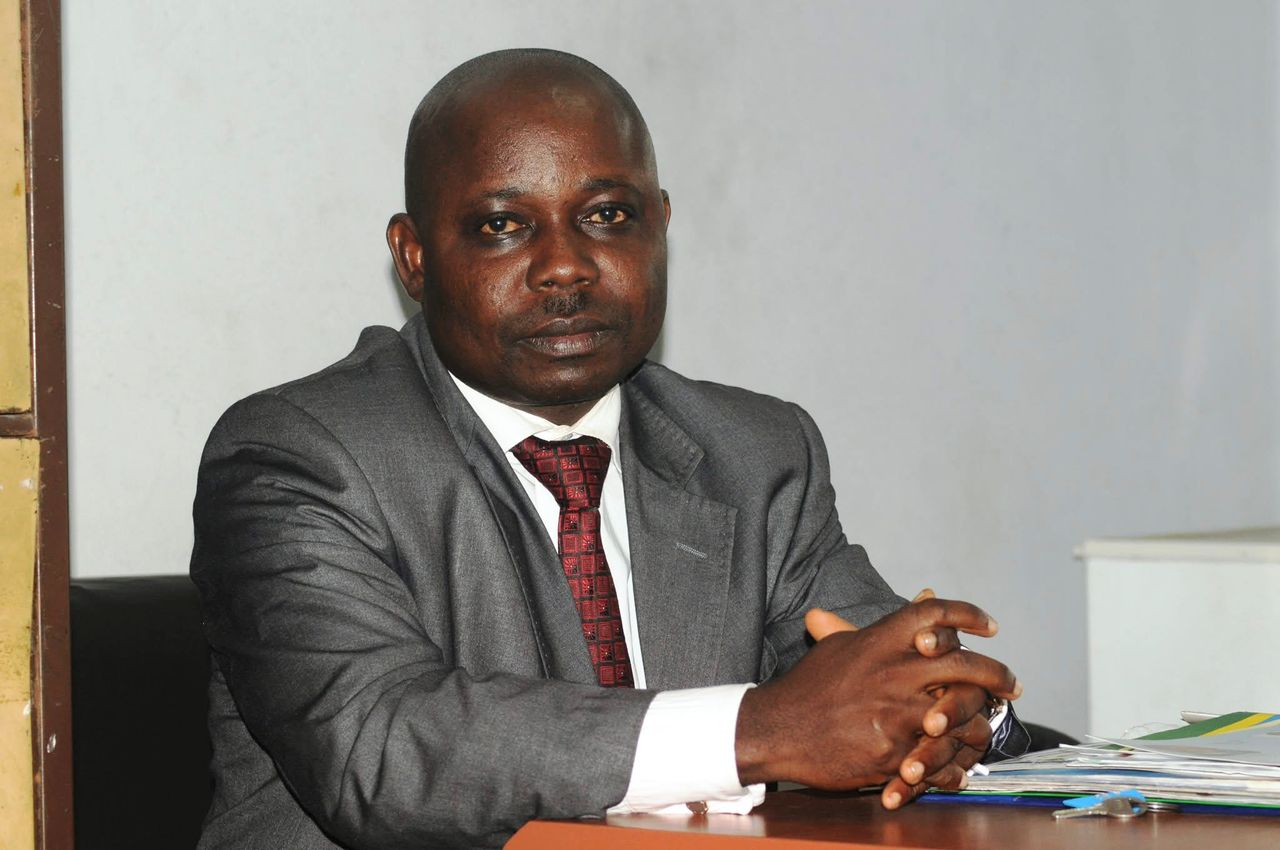
Ojukwu’s plight as a journalist practising in Nigeria is not new. According to Reporters Without Borders (RSF), Nigeria is one of West Africa’s most dangerous and difficult countries for journalists, who are regularly monitored, attacked and arbitrarily arrested. According to the organisation’s 2025 World Press Freedom Index, Nigeria is ranked 122nd out of 180 countries, which shows a sharp drop from 112th in 2024, underscoring the challenges facing journalists in the country.
Tayo Ikujuni, an editor with the News Agency of Nigeria (NAN), noted that frequent attacks on journalists might deter them from doing critical journalism that can sanitise the nation.
As a veteran, he is not new to the terrain. In his three decades of experience as a journalist, Ikujuni has been attacked thrice while covering protests and elections. The latest attack happened while covering the 2024 All Progressives Congress (APC) governorship primary election in Ondo state. His “crime” was his audacity to ask why vote counting had begun when electoral materials were yet to arrive. He was confronted by the state’s commissioner for youths and sports, who punched his hands, seized his mobile phones and threw them on the floor. One of the phones got damaged. Ikujuni said the commissioner also ordered his political thugs to attack him. The journalist was rescued by some party officials and security agents on duty.
Although the commissioner later apologised, the incident left a bad impression on Ikujuni’s mind. He wouldn’t advise any of his children to practise journalism. Most importantly, his wife felt traumatised by the incident. She heard the news of the attack on the radio, and she thought he was hurt. When she couldn’t reach him on the phone, she reached his husband’s colleagues until she found him at the press centre.
“She was so happy when she found me. She thought I was harmed or in the hospital and that the thugs must have injured me. She just said Thank God for saving your life. As the wife of a journalist, she would always advise me to be careful,” Ikujuni told TheCable.
“But I remember that incident often. I remembered last week. I feel like crying for the country, for our nation, because we shouldn’t have leaders like him (the commissioner). We should have leaders who relate to media professionals seamlessly.
“We are not doing the job enough because of fear, indirect intimidation. If you are not careful, someone somewhere will just write a petition against you. And you know our system. You will be taken out of circulation. There is always fear of the unknown.”
In Nigeria, press freedom is undergoing significant challenges despite constitutional guarantees and international human rights instruments. Though the 1999 Constitution, as amended, and international agreements protect freedom of expression, including the press, laws like the Cybercrime Act are used to prosecute journalists, and there are concerns about the potential for misuse to stifle investigative journalism.
The press attack tracker of the Centre for Journalism Innovation and Development (CJID) recorded 51 cases of press violations from May 2023 to June 2024, and 90 more cases registered between July and October 2024, with the report highlighting how journalists in Nigeria face regular monitoring, attacks, and arbitrary arrests.
IMPACT OF PRESS FREEDOM VIOLATIONS ON JOURNALISTS AND THEIR FAMILIES

In an interview with TheCable, Victoria Ibezim-Ohaeri, executive director of Spaces for Change, a research, policy, and advocacy non-profit, said analysis of a trend tracked by her organisation shows that press freedom is under attack, not just in Nigeria, but across West Africa. Hence, there is an increasingly hostile environment for journalists and the news media in general.
Ibezim-Ohaeri said journalists are proportionately targeted by repressive practices more than any other group of civic actors. She added that governments are increasingly weaponising security law to justify a crackdown on civic actors, including journalists and their media outlets.
“We also see the effect of these media violations on the family members of journalists. If they are looking for you, your wife is afraid, and your children are also paranoid about the surveillance on you. The government can put a terrorist or criminal tag on your person. The essence is to discredit you. It justifies any form of harsh measure invoked on you,” she said.
“The greatest impact on a journalist is self-censorship. You now tell yourself, please, my children are young. I don’t want any trouble. You restrain yourself from doing what you should do. Journalists who should lead the accountability campaigns are now refraining. They are afraid their properties might get seized, their children might get harmed, or they might get killed. They just married a new wife and so on.“
Abiodun Baiyewu, executive director of Global Rights, an NGO promoting justice, equality and human rights, further noted that attacks on journalists have far-reaching, deeply corrosive effects, not only on the journalists themselves but also on their families, their colleagues, and society at large.
She stated that some journalists have either fled Nigeria or have had to tone down their critical work of magnifying governance, speaking truth to power and demanding accountability.
“Things are definitely worse,” she said. “Despite our vibrant and courageous journalists, the space for free expression is constantly being eroded. The numbers speak for themselves. Nigeria dropped 10 places to 122nd in the 2025 World Press Freedom Index due to increasing threats to editorial independence, harassment of journalists and media organisations, and government interference in their functioning. Each year, the government finds a new way to gag them further.”
Baiyewu concluded that the civil society needs to maintain a united front and resist the tyranny of the government, adding that journalists should not have to run into exile or be afraid to publish the truth and demand accountability in a democracy.
This report is produced by Cable Newspaper Journalism Foundation (CNJF) in collaboration with the Centre for Journalism Innovation and Development (CJID) as part of a project documenting issues focused on press freedom in Nigeria.

